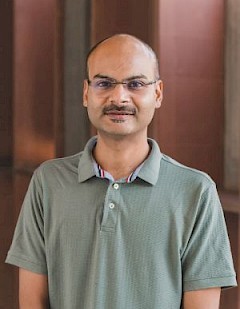Mathematical and Physical Sciences
Biological and Life Sciences

Jitesh Jhawar
Assistant Professor
PhD (Indian Institute of Science, Bengaluru)
+91.9632142925
http://www.jiteshjhawar.weebly.com
Research Interests: Animal Behaviour, Collective Behaviour, Self Organisation, Ecology and Evolution, Population Dynamics, Mathematical Modelling, Theoretical Ecology
Profile
Professor Jhawar’s research focuses on understanding group dynamics and underlying mechanisms that also fall under self organisation in biological systems. His research is driven by fundamental proximal questions on animal behaviour while they are in groups. Therefore, he is interested in asking these questions in different systems – birds, ants, fish, etc. His research is also highly interdisciplinary as he uses techniques like computer vision, motion detection, and machine-learning based techniques for data collection from videos of animal groups. He is setting up a new laboratory and would like to explore different systems out in the field in natural and semi-natural habitats to understand collective behaviour and the underlying mechanisms right where they have evolved. He completed his PhD at the Indian Institute of Science, Bengaluru (2019) where he studied schooling dynamics in fish and found an interesting mechanism of schooling based on simple pairwise interactions (Jhawar et. al., Nature Physics, 2020). He used data-driven models and computer simulations to infer such mechanisms. After completing his PhD, he moved to Max Planck Institute of Animal Behaviour and the University of Konstanz, Konstanz, Germany, for postdoctoral work where he worked on understanding the role of heterogeneity among individuals in collective dynamics. He also authored several grant proposals and won the prestigious Alexander von Humboldt Postdoctoral Fellowship.
For more details visit: www.jiteshjhawar.weebly.com
Research
Investigating role of heterogeneity in collective dynamics of honey bees and epithelial cells: (At the Max Planck Institute of Animal Behaviour and University of Konstanz, Konstanz, Germany, we have analysed the behaviour of a large number of honeybee individuals tracked using barcodes and computer vision algorithms over their entire lifetime. Using such a rich dataset, we are trying to understand the role of heterogeneity among individuals in the dynamics of collective behaviour, using a composite approach involving mathematical modelling and advanced data analysis techniques such as non-linear dimensionality reduction.
Epithelial cell migration: In another project as a postdoctoral fellow, I have looked at a very different system – epithelial cell migration. This is an ongoing project in collaboration with Dr Medhavi Vishwakarma from Indian Institute of Science, Bengaluru. By analysing such different and interesting systems, eventually, our broad goal is to identify mechanistic commonalities and differences in individual and collective behaviour across scales in biology.
Intrinsic noise in collective dynamics: (PhD work at Indian Institute of Science, Bangalore) We used a stochastic framework that accounts for intrinsic noise in collective dynamics arising due to (a) inherently probabilistic interactions and (b) finite number of group members. We derived equations of group dynamics from real data and from individual-level probabilistic rules, demonstrating that intrinsic noise induces schooling in fish groups. Such empirical evidence is rare, and tightly constrains the possible underlying interactions between fish. Our analytical model and simulations indicated that fish mainly align with each other one at a time, ruling out other complex interactions such as averaging or higher-order interactions.
Collective dynamics of swarms of Whirligig Beetles: (in collaboration with Dr Shashi Thutupalli, National Centre for Biological Sciences, Bengaluru) We extended our stochastic modelling and analysis framework to study Whirligig Beetles which show fascinating patterns of rotational group dynamics. We found that complex interactions between individuals are likely to be at play in the underlying observed group dynamics.
Publications
- Nabeel, Arshed, Ashwin Karichannavar, Shuaib Palathingal, Jitesh Jhawar, andVishwesha Guttal, 2022, PyDaddy: A Python package for discovering stochastic dynamical equations from timeseries data.” arXiv preprint arXiv:2205.02645.
- Jitesh Jhawar, Vishwesha Guttal, 2020, Noise-induced effects in collective dynamics and inferring local interactions from data, Phil. Tran. R. Society 375 (1807),20190381
- Jitesh Jhawar, Richard G Morris, Amith Kumar UR, M. Danny Raj, T. Rogers,Harikrishnan R, Vishwesha Guttal, 2020, Noise Induced Schooling of Fish, Nature Physics 16 (4), 488-493
- Jitesh Jhawar, Richard G. Morris, Vishwesha Guttal, 2019, Chapter 13 – Deriving Mesoscopic Models of Collective Behavior for Finite Populations, Editor(s): Arni S.R. Srinivasa Rao, C.R. Rao, Handbook of Statistics, Elsevier, 40: 551-594
- Abhishek Subramanian, Jitesh Jhawar, Ram Rup Sarkar, 2015, Dissecting Leishmania infantum Energy Metabolism - A Systems Perspective, PLoS ONE 10(9):e0137976
Teaching
Foundation Programme, Introductory Calculus, Mathematical Biology
